Want to cut down on your power consumption and create an energy efficient gaming set up? Here at Overclockers UK, we’ve searched high and low for all the key information that you need on energy efficient gaming and created our very own ultimate guide.
We’ll be showcasing why you should make your PC more efficient, the pros and cons, along with everything you need to reduce your energy costs whilst still enjoying outstanding gaming performance.

Why Should I Make My PC Energy Efficient?
An energy-efficient PC provides you with countless benefits, including a notable decrease to your energy bills.
Making your PC more energy efficient doesn’t mean you have to compromise on performance. In fact, you can still achieve the same level of AAA performance in your favourite games and intensive workloads. All whilst reducing the strain on your wallet.
Pro
- Help to decrease your energy bill.
- More environmentally friendly.
- Don’t have to compromise on performance – you can still achieve the same level with some energy efficient tweaks to your hardware and peripherals.
- Aren’t more expensive to build. Whilst you will have to spend more on certain components, such as a PSU with a high 80 Plus Rating, an energy efficient PC isn’t notably more expensive than your standard computer.
Con
- Are some limitations to what hardware you can use. For example, components with a hefty TDP are not energy efficient, therefore you need to avoid them.

How Can I Cut My Energy Costs on My Gaming PC?
Hardware
Packing your PC full of high-quality hardware is a must for you to achieve the performance levels that you desire. However, you can make several energy efficient options to help cut down the costs of running your PC.
PSU:
First up is a PSU with a high 80 Plus Rating. Every PSU is required to have this rating to ensure it has at least 80% energy efficiency at 20, 50, and 100% loads. There are six different ratings ranging from Bronze all the way to Titanium.
The higher the rating, the more energy efficient the power supply is. A more efficient PSU will help to decrease your consumption, reduce your energy costs, and ultimately help you to save money.
Kolink Regulator 850W 80 Plus Gold Modular Power Supply:
- Kolink Regulator series
- 850W
- 80 Plus Gold rated
- ATX 3.0
- Modular form factor
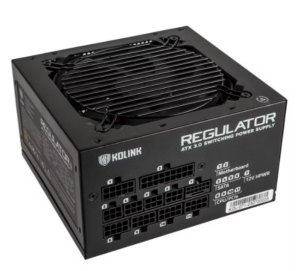
You can read more about 80 Plus Ratings in our dedicated blog guide.
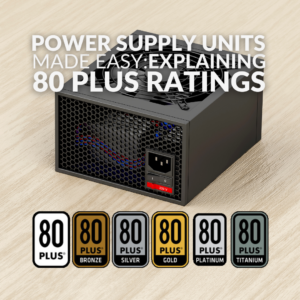
CPU:
Secondly, your CPU. A processor with a low wattage and TDP will be more energy efficient. Purchasing a low-wattage CPU doesn’t mean you have to compromise on performance. You can still achieve the same fast speeds in gaming and all your other heavy-duty workloads. In fact, there are several CPUs in the latest AMD Ryzen 7000 series that have been designed with a super low TDP of only 65W for maximum efficiency!
AMD Ryzen 7 7700 Processor:
- AMD Ryzen 7000 Series
- AM5 socket
- 8 cores and 16 threads
- Up to 5.30GHz boost clock speed
- Supports DDR5 RAM

What’s more, to cut down on your energy costs even more, you can also opt for an APU with integrated graphics. Choosing an APU over a dedicated GPU can help to reduce your power consumption further.
RAM:
An essential aspect of any gaming PC, RAM is vital for ensuring you can enjoy fast loading times with minimal latency. By utilising a RAM kit with a low voltage, you can still take advantage of all the benefits high-quality RAM brings, but with a reduction in your PC’s power demands.
In fact, the latest standard of DDR5 boasts huge improvements in memory bandwidth, module capacity, and much more, with a huge decrease in power consumption and voltages. Every component within a DDR5 module utilises only 1.1V!
Corsair Vengeance RGB 32GB (2 x 16GB) DDR5 6000MHz Dual-Channel RAM Kit:
- 32GB RAM capacity
- 2 x 16GB RAM modules
- DDR5 standard
- 6000MHz RAM speed

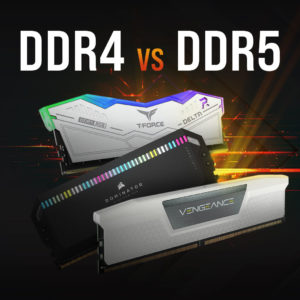
Want to read more about the improvements made to DDR5 RAM? You can do just that in our DDR4 vs DDR5 RAM guide.
Storage:
Last is your storage. Unlike an HDD, an SSD harnesses an integrated memory circuit to read and write all your stored data. The lack of moving parts make SSDs notably more energy efficient in comparison. These drives require less electricity and can even draw virtually zero power when idle as no data is being written or read.
Seagate FireCuda 530 1TB PCIe 4.0 NVMe M.2 SSD:
- 1TB storage capacity
- PCIe 4.0
- 7300MB/s read speed
- 6000MB/s write speed

An SSD is just one of the many storage solutions you can utilise in your gaming PC. Want to know more about the others? Check out the OcUK guide to storage.
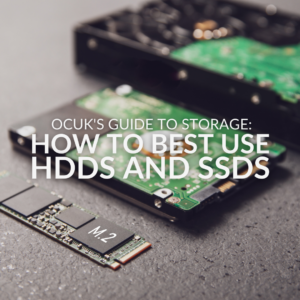
RGB Lighting:
We all love RGB, but all those colourful LED strips and fans will be eating up a lot of power. It might be time to consider choosing efficiency over aesthetics (gasp) and switching off your RGB.
Peripherals
Similarly, to your hardware, you can find energy efficient peripherals.
USB Hubs are a fantastic example of this. These have been designed to make organising all your accessories even easier, along with helping you cut down your energy consumption. They will typically include dedicated USB slots, each with an LED indicator to pinpoint which devices are on and drawing power. Don’t need those devices turned on? Then you can simply switch them off via the USB Hub.
Streamplify USB Hub Deck 5:
- USB hub
- 5 x ports
- 4 x USB 3.0
- 1 x USB 2.0A with power charging
- 7 x swappable keycaps
- Included cable clip
- RGB lighting

What’s more, opting for wired over wireless peripherals can help make your set up more efficient. Wired peripherals don’t require any regular charging. Instead, they draw their power out of your PC.
Looking to upgrade your gaming mouse or keyboard? You can browse the huge range of wired mice and keyboards that we have on offer by clicking the buttons below.
In addition to this, opting for a headset over speakers can help to decrease your energy costs. A headset is notably more economical in comparison to speakers.
To fully immerse yourself in your soundscapes using a headset doesn’t require the volume to be very high, meaning your headset won’t be drawing large amounts of power. However, with speakers, the volume will need to be notably higher to ensure you get the full effect, requiring more energy.
Looking to upgrade your audio and energy efficiency? Check out the full range of headsets we have on offer by clicking the button.
Monitors
You can also find gaming monitors that feature an Eco mode or an EnergyStar rating.
Those with a high Energystar rating will be more efficient, requiring less power to display your games and videos. Alternatively, with Eco mode, you can adjust when you want your monitor to switch to this setting and reduce its power consumption.
ASUS TUF Gaming VG27VQ 1920 x 1080 Gaming Monitor
- 27” gaming monitor
- 1920 x 1080 display
- VA panel
- 165Hz refresh rates
- 1ms response time
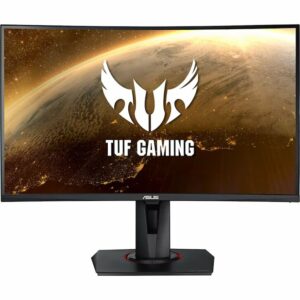
Another slice of food for thought is whether or not you really need a dual monitor set up.
The more monitors you have, the more power your set up will draw. What’s more, you also need to factor in the resolution of your monitor. The higher the resolution is, the more strain you are putting on your GPU, increasing your power consumption.
Built-in Tools
In Windows, you can adjust your PC’s power plan. Here you can customise when your system turns off after an extended period of inactivity, along with selecting between two different power plans – Balanced or Best.
Balanced is perfect for those who are planning on using their PC for work, simple web browsing, or watching content online. Alternatively, Best is suited for gamers who want to get the best possible performance out of their PC.

If none of these power plans suit your needs, then you can also opt for the ‘Power Saver’ mode. This will reduce consumption and save energy by limiting the performance of your PC where possible, such as when idle.
In addition to this, depending on the game you are playing, you can also implement FPS limiters. Putting a limit on your FPS will help you to save power along with reducing any excess noise or high temperatures in-game.
Don’t know how to check your FPS in Windows 10 and 11? We’ve got a blog that talks you through exactly that.

Last but certainly not least, don’t leave your PC turned on when you aren’t using it! An idle PC will still be drawing power, increasing your energy costs. If you aren’t using your PC, then simply turn it off.
Want to Read More About Energy Efficient Gaming?
Looking to learn more about how you can make your gaming PC energy efficient? We’ve got a great line up of posts from the Overclockers UK blog all about energy efficient gaming.
Looking to make your gaming PC more energy efficient? Here’s a round up of the best hardware you need to help make your PC more efficient.


Want to level up your gaming performance without breaking the bank? Check out the best energy efficient gaming PC and accessories.
Want to save a few extra pennies when it comes to your peripherals and energy bills? Here are our top energy efficient peripherals!


Looking to build an energy efficient PC? Here’s what you need to know.
Want to know how much electricity a PC will use on average? We’ve done the maths and worked it out for you.

Share Your Energy Efficient Gaming Tips
Do you have any helpful tips on how to make your gaming PC more efficient? Share them in the comments below.
